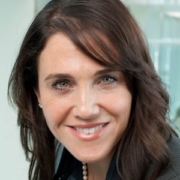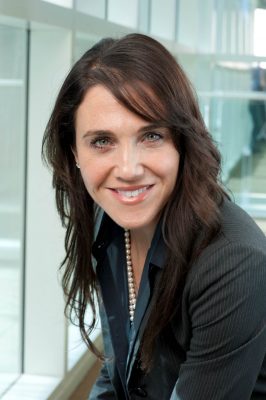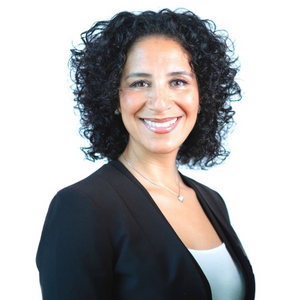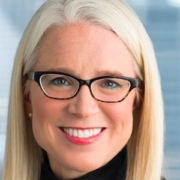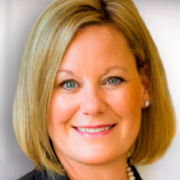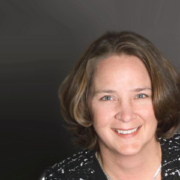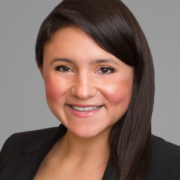Voice of Experience: Carey Kolaja, Global Chief Product Officer, Citi FinTech
“Earlier in my career, I thought I always had to be right, but I learned that’s just not the case,” says Carey Kolaja of Citi FinTech. “Life is more enjoyable when you remove that pressure you’re putting on yourself and turn to others for input. The collective wisdom can yield a greater return,” she says.
Kolaja has had 21 years in financial services, but a series of diverse experiences – which has run the gamut from start-ups to big banks to consulting firms — has taught her to trust the input of others as she learned new strategies with different companies.
She worked in the information technology department of eBay and most recently came from PayPal, where she experienced incredible growth, seeing the company mature from 1,000 employees when she started to 14,000 when she left. It was an environment where every couple of years the company would reinvent itself, and she oversaw a host of different challenges over 13 years as she rose through the ranks to become Vice President of Global Consumer Products, helping establish the brand to hundreds of millions of customers globally.
Building Programs That Endure
“I am fortunate to have risen to a role that allows me to be at the epicenter of the collision between finance and technology, during a time of great growth and change,” she says. “I am proud of the global products I’ve placed in the market over the years and the impact they’ve had in transforming consumer buying behaviors,” Kolaja adds.
Not only has she made her mark on products, but programs as well. At eBay she was asked to establish a women in tech program that started with 50 and ended with 1,800 by the time she passed the baton. “It continues to live on, and it’s exciting when you can build things that endure. I have always defined successful leadership as making others better as a result of your presence, and making sure that impact lasts in your absence,” she says, noting that the programs that have been most meaningful are those that were organic, rather than mandated from the top down.
Managing Industry Disruption
The team Kolaja now works with, Citi FinTech, has been set up within the past 12 months — a unit charged with “designing and delivering the bank of tomorrow,” as the industry moves forward to stay relevant in this fast-moving space. “There’s been some disbelief that what we were trying to do would happen,” she says, given that there are such stringent policy restraints, and the huge leap involved in its aim to meet customers in their day-to-day lives and access their money whenever they need to in today’s digital and mobile world. “The odds are against us but if you look at what we’ve accomplished so far and what we have in the works for the months ahead, it shows that you can’t discount the banks,” she says.
The disruption has happened throughout the industry, as people’s identities have moved from the physical to the digital realm, and every company from established firms to startups are trying to figure out how to enable people to safely and confidently make financial transactions. As the physical bank’s role continues to change, the industry will continue to reimagine the personalities that financial instructions have, by learning from fintech and other industries.
“The expectations have changed and it’s all about enabling transactions for our customers when and where they want, and often while they’re doing something else,” she says.
“While a customer is eating dinner she remembers she needs to check her savings account for an upcoming family vacation. How do we help in that moment? We will continue to transcend traditional touchpoints as we engage customers on their terms and meet their goals and aspirations.”
Part of the change in the industry is being wrought by a general change in the trust dynamic in society at large, she believes. Whereas people used to trust institutions, now they trust brands. We used to trust hotels, and now we stay at people’s homes in the Air BnB society.
But embracing this transformation is part of who Kolaja is and how she has always led. “I have always coached my team by leading with the fact that you have to be able to imagine that the possibilities of change are endless, and that those who change the world are those who believe they can.”
She has learned the value of empowering others, and her global role has allowed her to see what she can learn in different cultures that was relevant across the board. That notion helped her to understand the value of diverse thoughts, experiences and points of view. “Most boundaries – whether they are cultural or organizational — are usually artificial, and exist in your own mind,” she says, noting that you can’t let others impose their boundaries on you.
Although she hasn’t felt subject to gender differences in the workplace, she understands that others look up to her for the strides she has made in fintech. When someone pointed out that she had found a way to break the glass ceiling and therefore had the responsibility to be a role model and speak out, she accepted that charge. Now, she is proud to say that 50 percent of leaders in Citi FinTech are women.
Speaking Out to Achieve Success
One piece of advice she offers women is to give themselves permission to speak, rather than always waiting for an invitation or a safe environment. It was during a week-long leadership program that her coach noted that people would listen when Kolaja spoke, despite her always waiting to be asked to speak. The coach advised her to make a habit of speaking up in the first three minutes of any interaction, which Kolaja says helped her believe that what she had to say added value. “That’s such an important coaching element for women in general,” she says. “I am the only one who can give myself permission to speak. That leadership program happened more than 10 years ago but I’m reminded of that lesson every day. If we limit ourselves, then ultimately we’re the ones who lose out.”
Kolaja says she tried and failed to separate her work and personal lives, so she incorporates them as much as she can. “Sometimes I need to be a mother in the middle of the afternoon and sometimes I need to be an employee at 10 p.m. Technology is helping me with both, and now the physical-digital balance is what I contend with.”
As a family of self-described “risk takers,” she and her husband and two boys, ages 14 and 10, love to travel as a family and golf and scuba dive. Recently they spent five days in Costa Rica with no devices. “Scuba diving allows us to spend time together, and it also allows us to be truly present. Now that we’re connected even while we’re in the air, the sea is the one remaining place we can have solitude.”

